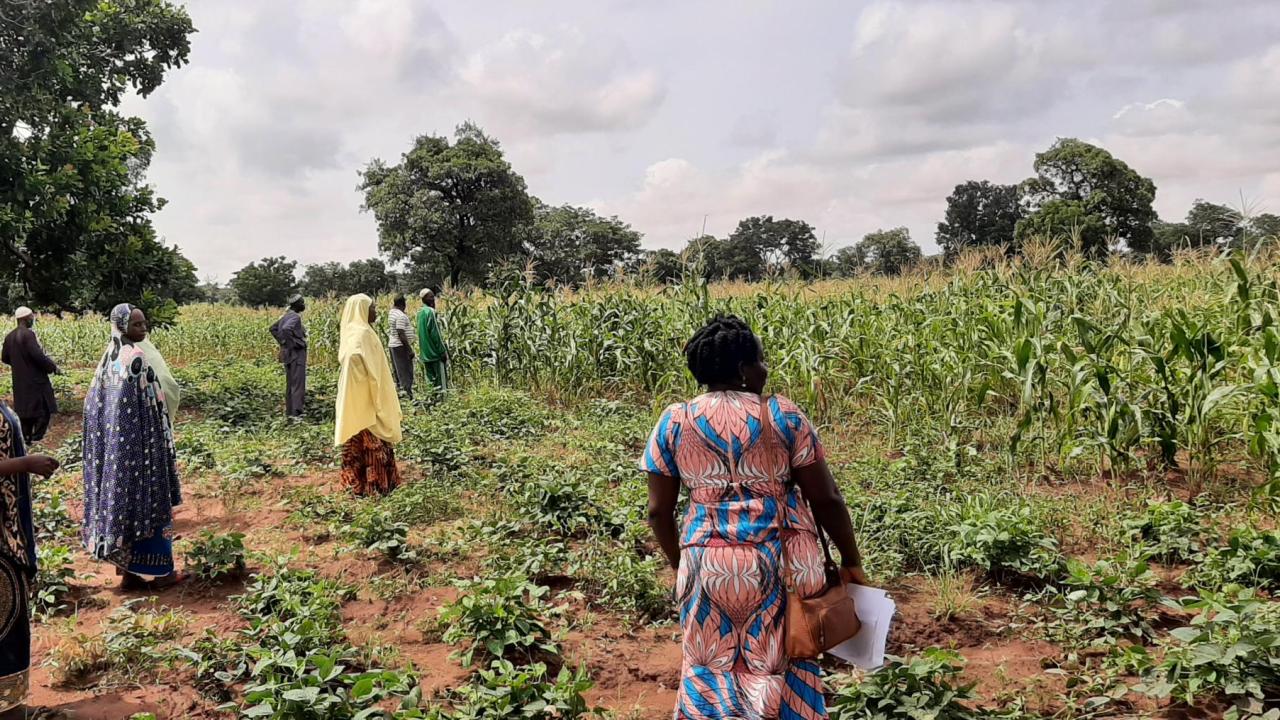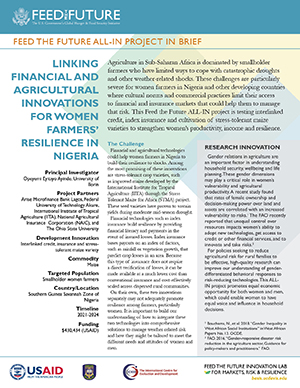
Agriculture in Sub-Saharan Africa is dominated by smallholder farmers who have limited ways to cope with catastrophic droughts and other weather-related shocks. These challenges are particularly severe for women farmers in Nigeria and other developing countries where cultural norms and commercial practices limit their access to financial and insurance markets that could help them to manage that risk. This Feed the Future ALL-IN project is testing interlinked credit, index insurance and cultivation of stress-tolerant maize varieties to strengthen women’s productivity, income and resilience.
Project Overview
Principal Investigator: Opeyemi Eyitayo Ayinde, University of Ilorin
Project Partners: Arise Microfinance Bank Lagos, Federal University of Technology Akure, International Institute of Tropical Agriculture (IITA), National Agricultural Insurance Corporation (NAIC), and The Ohio State University
Development Innovation: Interlinked credit, insurance and stress-tolerant maize variety
Commodity: Maize
Targeted Population: Smallholder women farmers
Country/Location: Southern Guinea Savannah Zone of Nigeria
Timeline: 2021-2024
Funding: $430,434 (USAID)
The Challenge
Financial and agricultural technologies could help women farmers in Nigeria to build their resilience to shocks. Among the most promising of these innovations are stress-tolerant crop varieties, such as improved maize developed by the International Institute for Tropical Agriculture (IITA) through the Stress Tolerant Maize for Africa (STMA) project. These seed varieties have proven to sustain yields during moderate mid-season drought.
Financial technologies such as index insurance build resilience by providing financial literacy and payments in the event of insured losses. Index insurance bases payouts on an index of factors, such as rainfall or vegetation growth, that predict crop losses in an area. Because this type of insurance does not require a direct verification of losses, it can be made available at a much lower cost than conventional insurance and cost-effectively scaled across dispersed rural communities.
On their own, these two innovations separately may not adequately promote resilience among farmers, particularly women. It is important to build our understanding of how to integrate these two technologies into comprehensive solutions to manage weather-related risk and how they might be tailored to meet the different needs and attitudes of women and men.

Research Design
This ALL-IN research, led from the University of Ilorin, is testing whether a bundle of financial services, insurance and stress-tolerant maize varieties can build resilience to shocks among smallholder farmers in Nigeria. The project includes an equal proportion of women and men from 96 randomly selected villages across four states in Nigeria.
This project is being implemented as a randomized controlled trial (RCT) to determine the impacts of the treatments apart from any other factors that could change the selected outcomes. The RCT divides villages selected to participate in the study into four groups:
- T1: Training on stress-tolerant maize plus seeds offered at a partially subsidized price for three years
- T2: In the first year only, farmers receive financial literacy training and are invited to apply for a subsidized production loan of up to $200 and, if approved for the loan, are given an area-yield index insurance contract covering up to 50 percent of the value of the loan
- T3: Both T1 and T2 interventions
- Control: No programming
The baseline survey collects data on farmers’ socioeconomic characteristics as well as their attitudes towards financial services, insurance and stress-tolerant maize. After each year’s planting season, the team is collecting data on farmers’ plots. The team is also designing a logbook for participating farmers to regularly record their farming activities.
The research team is measuring multiple outcomes by gender. The project is measuring differences in men’s and women’s access to financial services, insurance and stress-tolerant seeds. The project is also analyzing differences in men’s and women’s willingness to adopt these three tools as well as how they perceive agricultural risk.
The project treatments are provided by partner organizations. The STMA research team is providing farmers the training on stress-tolerant maize and is subsidizing the purchase cost of the seeds. SHINE is providing the financial literacy training and making the production loan available. The research team is paying the cost of the index insurance coverage.
Development Impact
Understanding constraints on women farmers and the forces that drive gender gaps in agricultural productivity and resilience is critical for developing policies that bring inclusive benefits across rural communities. This project provides evidence on instruments that help women smallholder farmers to better cope with agriculture-related risks that dominate Nigeria’s agricultural sector.
This project also supports a number of USAID and Feed the Future objectives in Nigeria. As outlined in the USAID Country Development Cooperation Strategy (CDCS) for Nigeria, this project contributes to Objective 1 of inclusive economic growth by building income, food security and private sector contributions. The project also supports the Special Objective of greater stability and early recovery by creating new ways for farmers to become resilient to weather-related shocks. These objectives overlap with Feed the Future activities in Nigeria that seek to improve farmers’ access to finance, agricultural inputs and technologies for strengthening resilience with a particular focus on empowering women and youth.
Through its private-sector partners, the project is creating an enabling environment for rural smallholder men and women farmers to access financial services and insurance that could increase their productivity and resilience to shocks. It will promote the adoption of stress-tolerant seeds while building the capacity of farmers, extension agents and researchers in Nigeria.
This report is made possible by the generous support of the American people through the United States Agency for International Development (USAID) cooperative agreement 7200AA19LE00004. The contents are the responsibility of the Feed the Future Innovation Lab for Markets, Risk and Resilience and do not necessarily reflect the views of USAID or the United States Government.
